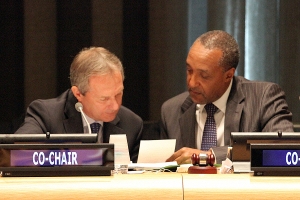The delegate of Vietnam opened the meeting with criticism towards China for illegally placing vessels and commencing deep-sea mining in the continental edge of Vietnam. Vietnam accused China of infringing sovereignty as they invade the economic zone and shelf of Vietnam including the use of military ships to fire canons at Vietnamese fishing vessels. A delegate of the Philippines fully supported statements by Vietnam. The delegate of the Philippines also emphasized that maritime zones are declared and mapped so that there is greater certainty of sovereign rights and jurisdiction. These mappings, he continued, should be based on charts, historical evidence of sovereignty as well as conventions.
A delegate of the People’s Republic of China responded to these remarks explaining that commissions on the limits of the continental shelf give China sovereignty over the region. In particular the Xisha Islands that are an inherent part of China’s territory despite Vietnam’s claims that historic evidence gives Vietnam sovereignty over the islands and surrounding waters. China explained to the meeting that as Chinese companies started gas exploration drilling in the region armed Vietnamese boats attacked the operation undermining stability of the waters. The delegate of Russia expressed that this bilateral dispute is inappropriate to discuss on the Law of the Sea multilateral platform, Sri Lanka agreed with Russia in hope that the states would in their own time find a peaceful solution.
Delegates of Malaysia, India and Kenya all expressed concerns for long-term sustainable fisheries and conservation of the natural sea environment. A delegate of Pakistan shared that there are over 1.5 million seafarers each year, many of whom are migrating by sea and there continues to be significant safety concerns. Despite the ever increasing human, technological and financial capacity of the world today, legal frameworks and human rights regarding international waters continues to be a fragmented system needs to be repaired.
Meeting Title: United Nations Convention on the Law of the Sea – 175th Meeting
Speakers: Delegates on behalf of: Vietnam, India, Philippines, Kenya, Indonesia, China, Malaysia, Sri Lanka, Pakistan, Costa Rica, Russia, Japan, El Salvador, Somalia, Haiti, an Cyprus; Director of the Secretariat
Location: United Nations HQ, Conference Room 1, New York
Date: 13 June 2014
Written by WIT representative: Sophia Griffiths-Mark





